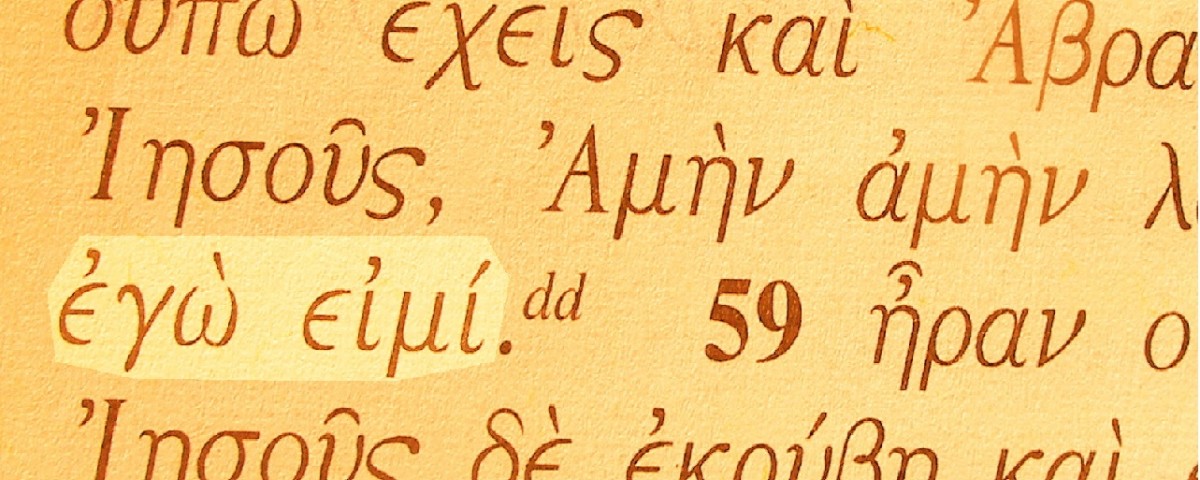
Did Isaiah see Jesus as God In Heaven?
August 16, 2016
The Easy Language of Matthew & Luke
September 3, 2016Does Jesus use of “I am” [ego eimi] mean he is God?

By Alane Rozelle
In John 9:9, the healed-but-formerly-blind man kept saying “I am”, the exact same two Greek words that Jesus uses when he makes his “I am” statements (as recorded throughout the book of John). First, it’s interesting to note that when the blind man says “ego eimi,” it is usually translated as “I am he,” referring, of course, to his attempt to clarify to everyone that, ‘Yes! I am he, the former blind man, but now I’m healed.’ Yet when Jesus says the same thing in order to identify himself as the Jewish Messiah (John 4:26), it’s usually rendered as “I am” or even “I AM” (CEB, ISV, JUB, TLV). This in turn is popularly, but erroneously, used to support the falsehood that Jesus was somehow claiming to be God, since in the OT God/Yahweh said to Moses “I am that I am,” (Exodus 3.14, lit. “I will be that I will be”).
When Jesus spoke to the Samaritan woman he was only claiming to be the Messiah, the Christ of the woman’s declaration in the verse immediately preceding (4:25). Elsewhere in John, Jesus is recorded as stating that he is the “bread of life” (6:35) and “the resurrection and the life” (11:25). But saying “ego eimi the bread of life” is nothing like declaring “I am that I am/I will be that I will be” to Moses (Ex 3:14). In fact, the wrong two words are being emphasized.
Note that it’s not the “ego eimi” of God’s self-revelation that is the focus for those who say Jesus is God. The real declaratory focus are the subsequent two words—“ho hon”—the Divine identifiers if you will! In the NIV God says to Moses: “I am [ego eimi] who I am [ho hon]. This is what you are to say to the Israelites: ‘I am [ho hon] has sent me to you.’ ” But the English translations highlight the wrong two words, i.e., instead of ego eimi it should be ho hon. Again, note that God didn’t say to Moses, “ego eimi has sent you” but that, “ho hon has sent you.” (Cp. Philo, Life of Moses, vol. 1.75: “He who is.”)
The NT writers do not record Jesus ever using “ho hon” in reference to himself, let alone “ego eimi ho hon.” Furthermore, what other words would you have Jesus use in order to identify himself? For example, when you say “I am a teacher” or “I am Bob” or “I am the only one who has the key to that door,” if you were to write them in Greek the same words would be used as self-identifiers: “ego eimi.” There is no simpler way to identify you! Lest you get really awkward! “The person who is speaking to you is a teacher/is Bob/is the only one who has the key.” Weird!
Jesus never said “I AM” or “I am that I am” or “I will be what I will be.” He simply said, “I am the good shepherd; I am the way, the truth and the life; I am the vine,” etc. Like the healed blind man, Jesus was only trying to identify himself for those either asking, or looking for him (cp. John 18.4-8).
Jesus never claimed to be YHWH; He never claimed to be “The Great I AM” of the OT, YHWH. He did, however, repeatedly claim to be the unique Son of God, the Lord’s Messiah (Luke 2.26).
![Does Jesus use of “I am” [ego eimi] mean he is God?](http://thehumanjesus.org/images/mainthjlogo.png)